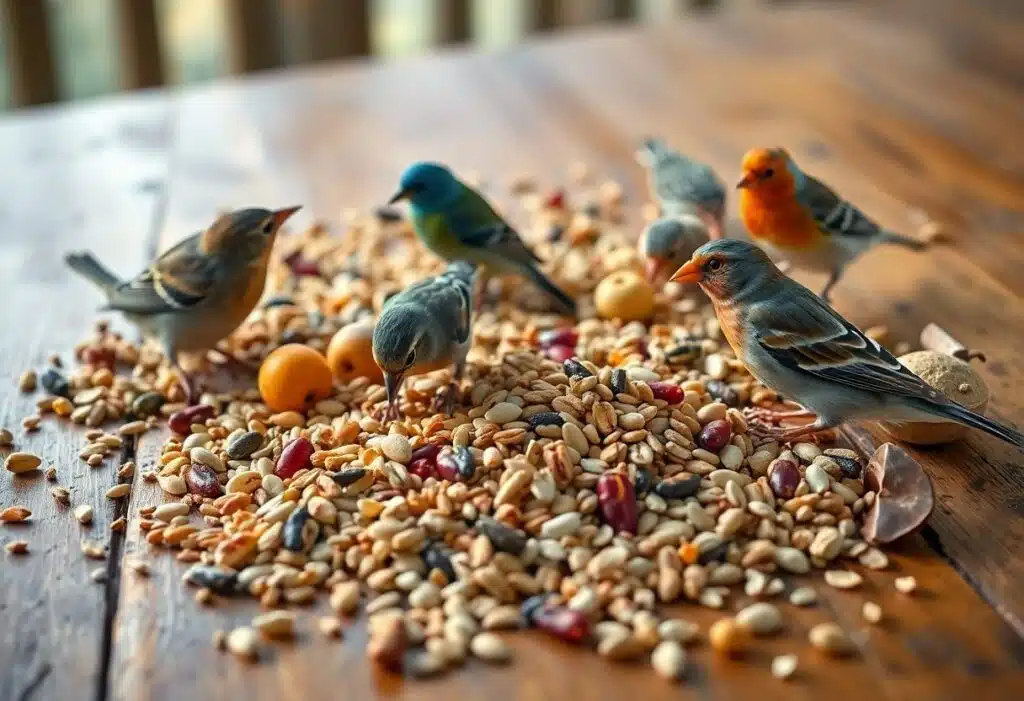10 Mind-Blowing Secrets About Bird Food for Wild Birds You Never Knew!
As you fill your backyard bird feeder, have you ever wondered what really goes into attracting those beautiful wild birds to your yard? You might be surprised to learn that not all bird food is created equal, and some types can even be harmful to your feathered friends. In this article, we’ll reveal the top 10 secrets about bird food that you need to know to create a bird-friendly haven in your backyard. From the benefits of black oil sunflower seeds to the dangers of “fillers” and how to keep squirrels at bay, we’ll cover it all. So, get ready to learn how to attract a variety of wild birds to your yard and make a positive impact on their lives.
Key Takeaways:
- Sunflower Seeds are a Hit! Pertaining to attracting a wide variety of birds, sunflower seeds and cracked corn are the way to go. They’re a great source of high-energy food, and there are two kinds to choose from: black oil and striped. Black oil seeds have thin shells and high-fat content, making them perfect for winter birds, especially when placed in tube feeders.
- Avoid Fillers and Oilers! Mixtures with “fillers” like red millet, oats, and other ingredients can lead to a lot of waste as birds sort through the mix. Instead, opt for high-quality seeds that provide real nutrition. And, if you’re tired of subsidizing unwanted bird species, try switching to striped sunflower seeds!
- Keep it Fresh and Clean! It’s important to offer fresh seed and keep your bird feeders clean to avoid spreading diseases and parasites. Also, be mindful of the amount of seed you offer, as it can spoil quickly and attract unwanted visitors like squirrels.
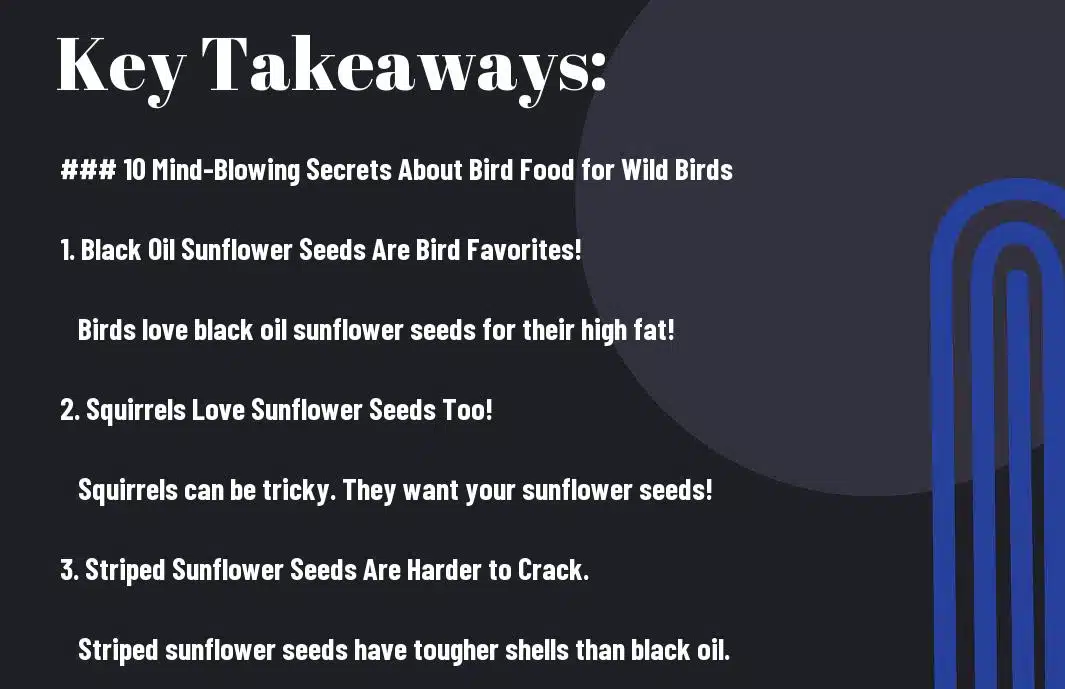
The Importance of Bird Nutrition
Your backyard birds rely on you to provide them with the right nutrients to thrive. A well-balanced diet is vital for their survival, especially during harsh weather conditions. When you offer high-quality bird food, you’re not only attracting more birds to your yard, but you’re also helping them stay healthy and strong.
A good bird food mix should include a variety of seeds, nuts, and fruits that cater to different bird species. Avoid fillers and cheap ingredients that can be harmful to birds, and opt for fresh seed mixes that are rich in fat and protein. By providing the right nutrition, you’re creating a welcoming habitat for your feathered friends and supporting their overall well-being.
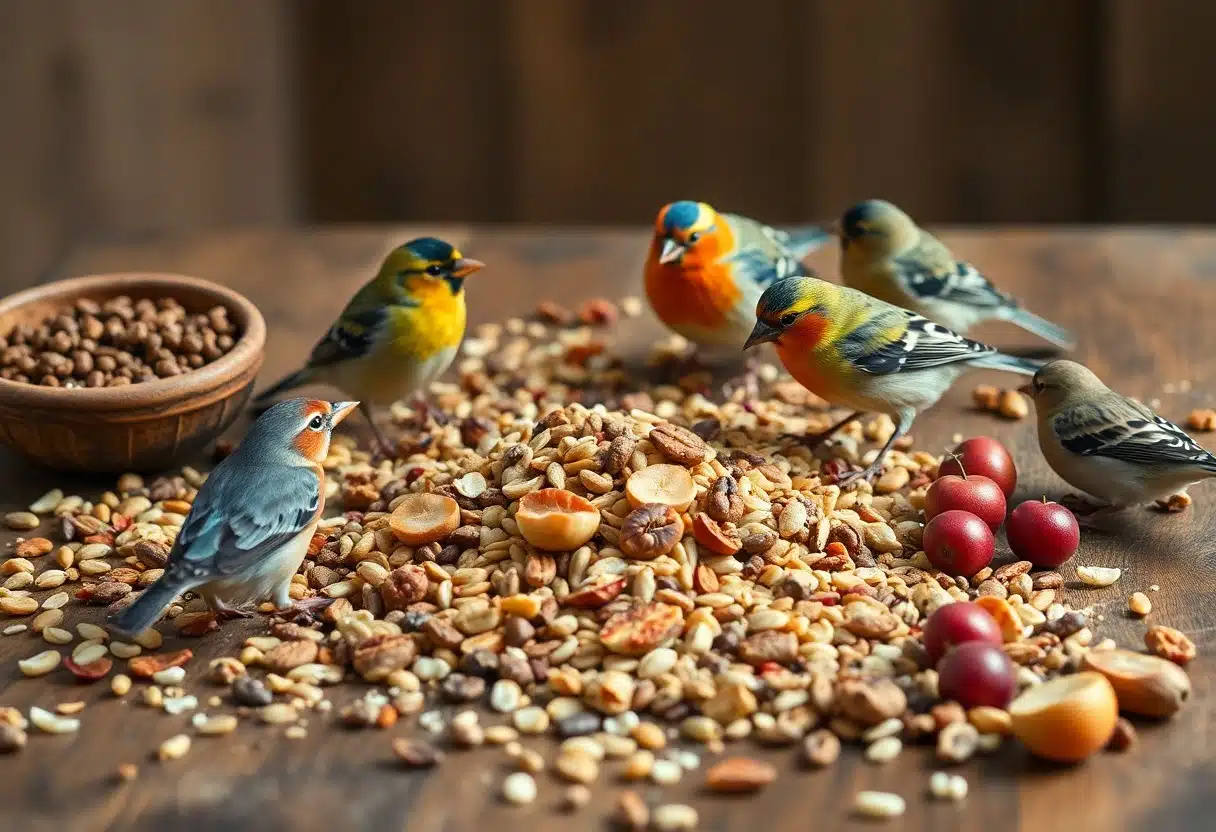
Common Misconceptions About Bird Food
Some people think that all bird food is created equal, but that’s far from the truth; a guide to seed types can help clarify this. You might be surprised to learn that many commercial bird seed mixes contain “fillers” like millet, oats, and corn, which are not only unappealing to most birds but also create a lot of waste. On the other hand, high-quality seed mixes with ingredients like black oil sunflower seeds, peanuts, and suet can be a game-changer for attracting a variety of birds to your backyard. Don’t “fill” your feeders with cheap mixes; instead, opt for fresh, nutrient-rich seed that will keep your feathered friends coming back for more.
The Best Seeds for Attracting Different Species
Any bird enthusiast knows that offering the right seeds can make all the difference in attracting a variety of species to your backyard. Sunflower seeds are a staple for most bird feeders, as they attract a wide range of birds. However, did you know that there are two kinds of sunflower seeds: black oil and striped? Black oil sunflower seeds have thin shells and high fat content, making them a favorite among winter birds.
Striped sunflower seeds, on the other hand, have thicker shells, making them less accessible to House Sparrows and blackbirds, which prefer easier food options. Offering the right seed mix, such as varieties of seed that include sunflower seeds and cracked corn, can help attract different types of birds, such as finches, woodpeckers, and cardinals. By providing a mix that includes white millet, nyjer, and peanuts, you can create a welcoming habitat for many bird species.
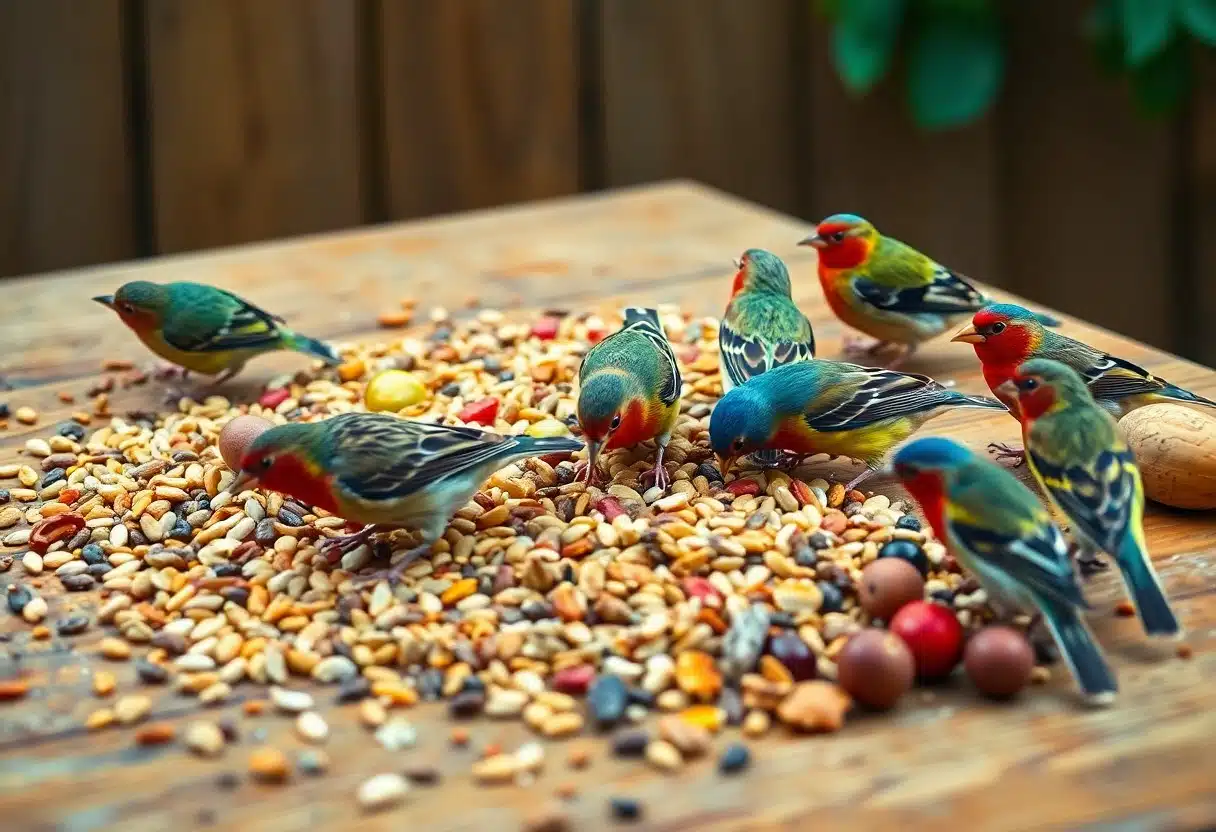
Lesser-Known Foods That Birds Love
Even if you’re familiar with popular bird foods like sunflower seeds and suet, there are some lesser-known options that can attract a variety of birds to your backyard. Nyjer seed, for example, is a favorite among finches and sparrows, while peanut pieces are loved by woodpeckers and jays.
Safflower seeds are another option that’s often overlooked, but they’re a great choice for attracting cardinals and finches without attracting squirrels. By offering a mix of these lesser-known foods, such as cracked corn and sunflower seeds, you can create a more diverse and attractive bird-friendly habitat in your backyard.
The Benefits of Suet Cakes
Assuming you want to attract a variety of wild birds to your backyard, offering suet cakes can be a great way to do so, as many birds love this type of food. As mentioned in Know Your Birdseed!, suet cakes are a high-energy food that many birds, such as chickadees, nuthatches, woodpeckers, and bug-eating birds, love. Suet cakes are especially beneficial during harsh winter weather when natural food sources are scarce. Straight suet is even more effective, although it can be expensive. By offering suet cakes, you can provide your feathered friends with the energy they need to survive the cold winter months.
The Risks of Improper Bird Feeding
Many unintended consequences can arise from improper bird feeding practices. You might be unknowingly harming the very birds you want to help. For instance, offering low-quality seed mixes with “fillers” like millet, oats, or corn can lead to a lot of waste, as birds sort through the mix to find something edible.
Moreover, freshness matters, as stale or moldy seeds can harbor dangerous bacteria. Additionally, feeding birds in large quantities or using the wrong types of feeders can attract unwanted visitors, like squirrels, which can dominate the feeder and leave little for the birds. It’s vital to be mindful of these risks and take steps to mitigate them, ensuring that your bird feeding efforts have a positive impact on the local bird population.
Conclusion
Considering all points, you now have a comprehensive guide to creating a bird-friendly habitat in your backyard. By offering the right types of bird food, such as sunflower seeds, and maintaining a clean and safe feeding environment, you can attract a variety of wild birds to your garden. Recall, it’s important to avoid “fillers” and opt for high-quality seed mixes that cater to the specific needs of different bird species. With this knowledge, you’re ready to commence on a rewarding journey of feeding and watching wild birds thrive in your backyard!
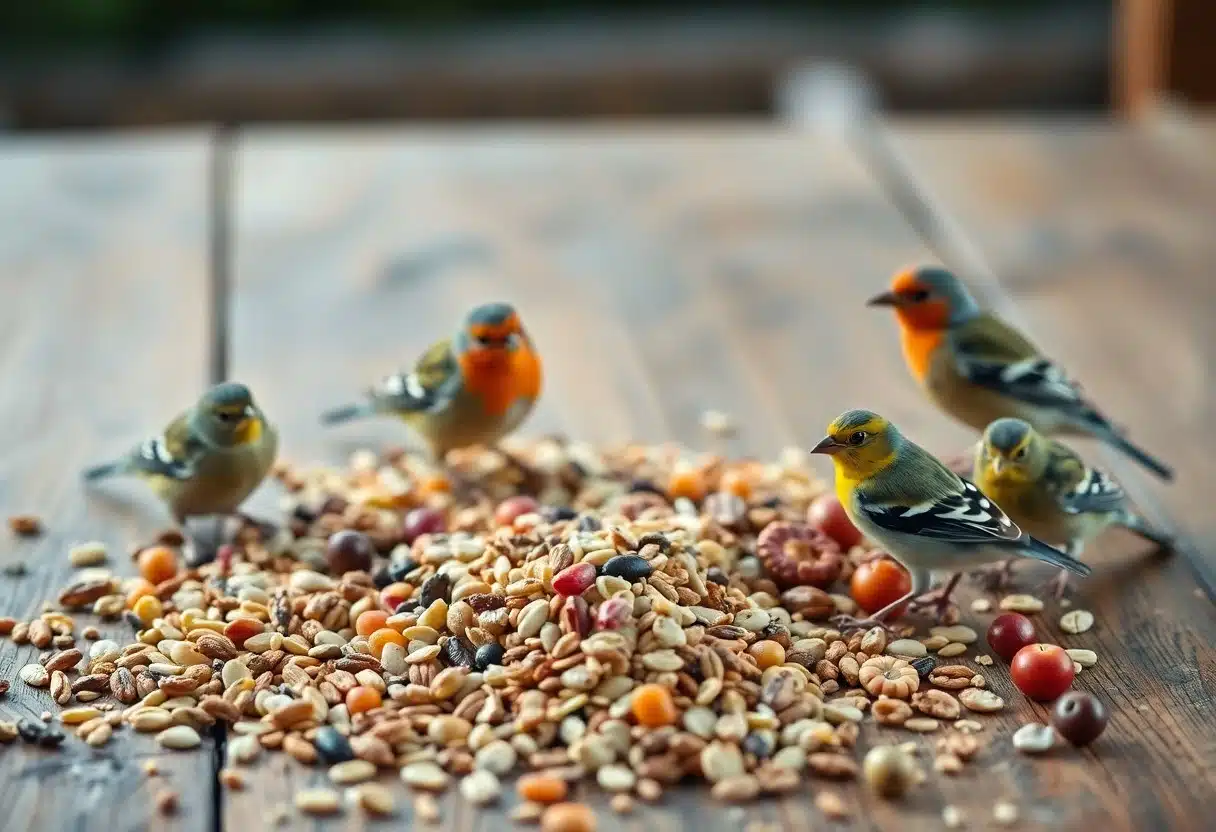
FAQ
Q: What is the best type of bird food to offer in my backyard?
A: Sunflower seeds are the best source of high energy food for wild birds and attract the widest variety of birds. Specifically, black oil sunflower seeds have thin shells and high fat content, making them extremely valuable for most winter birds.
Q: Are there any types of bird food that I should avoid offering?
A: Yes, never feed bread to wild birds as it provides little nutrition and can cause an unhealthy condition. Also, avoid mixes that contain “fillers” like red millet, oats, and other ingredients that can lead to a lot of waste.
Q: How can I keep squirrels from eating the bird food?
A: Offer sunflower seeds in the shell, as they are less attractive to squirrels. You can also use specialized feeders, such as squirrel baffles and tube feeders, and place them in areas that are difficult for squirrels to access.
Q: What is the importance of cleaning my bird feeders?
A: Cleaning your bird feeders is crucial to avoid the spread of viruses and parasites. Make sure to properly clean your feeders to keep the birds healthy and safe.
Q: Can I offer suet to the birds in my backyard?
A: Yes, many birds love suet, especially chickadees, nuthatches, woodpeckers, and bug-eating birds. You can make your own suet cake using peanuts and high-quality ingredients, or offer straight suet, which is a bit more expensive.
As a bird enthusiast with a passion for sharing the wonders of our feathered friends. As a writer and nature lover, I'm thrilled to connect with fellow bird buffs and inspire others to take flight into the fascinating world of birds. Let's wing it together!

